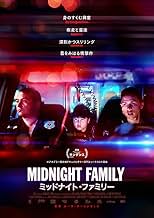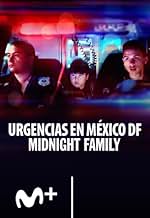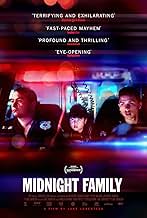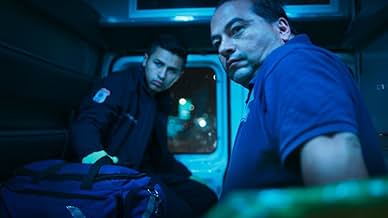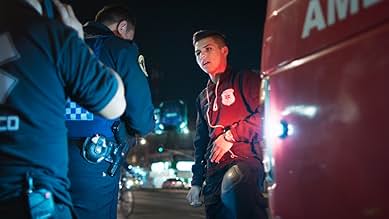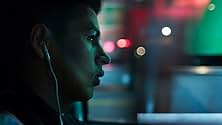IMDb RATING
7.4/10
2.1K
YOUR RATING
In Mexico City's wealthiest neighborhoods, the Ochoa family runs a private ambulance, competing with other for-profit EMTs for patients in need of urgent help.In Mexico City's wealthiest neighborhoods, the Ochoa family runs a private ambulance, competing with other for-profit EMTs for patients in need of urgent help.In Mexico City's wealthiest neighborhoods, the Ochoa family runs a private ambulance, competing with other for-profit EMTs for patients in need of urgent help.
- Awards
- 26 wins & 26 nominations total
Juan Ochoa
- Self
- (as Juan Alexis Ochoa)
Josue Ochoa
- Self
- (as Josué Ochoa)
- Director
- Writer
- All cast & crew
- Production, box office & more at IMDbPro
Featured reviews
A mesmerizing and important documentary on a family's struggle and the broken health care system that ensnares their lives. Complicated and narratively complex, this film has stayed with me. Beautifully photographed and edited, as well.
Imagine a member of your family. They were injured and they required immediate assistance. So you call for an ambulance. The ambulance showed up. Took care of your family. Drove you both to the hospital. Then they ask you for compensation. Would you be angry with them? Would you take it for granted that if you or your loved ones should fall ill or have an accident that they would get the help they need? The help they are entitled to. Why then would you pay good money for such a service?
This movie tackles this issue head on as we follow the Ochoa family, consisting of a lovable father and his, mature-for-their-age teenage sons, as they burn rubber to be the first paramedics on the scene. It emphatically delves into what it means to be part of a necessary and, what some might call, predatory occupation. Because even after charging large sums for their services, the family barely scrapes by after (required) bribes, legislation, arrests and competition make a dent on their bottom line.
Documentarian Luke Lorentzen is so close up to the action, and shoots so well the astonishing and heartbreaking scenes he encounters that this might be mistaken for a feature film. Few filmmakers would dare or even be able to come as close as Lorentzen does here, which allows him to reveal the ugliness of a system that in the end affects patients the most.
For a documentary it is a rare treat to experience something that is as entertaining as it is eye-opening, making Midnight Family something of a rarity.
This movie tackles this issue head on as we follow the Ochoa family, consisting of a lovable father and his, mature-for-their-age teenage sons, as they burn rubber to be the first paramedics on the scene. It emphatically delves into what it means to be part of a necessary and, what some might call, predatory occupation. Because even after charging large sums for their services, the family barely scrapes by after (required) bribes, legislation, arrests and competition make a dent on their bottom line.
Documentarian Luke Lorentzen is so close up to the action, and shoots so well the astonishing and heartbreaking scenes he encounters that this might be mistaken for a feature film. Few filmmakers would dare or even be able to come as close as Lorentzen does here, which allows him to reveal the ugliness of a system that in the end affects patients the most.
For a documentary it is a rare treat to experience something that is as entertaining as it is eye-opening, making Midnight Family something of a rarity.
Greetings again from the darkness. It would be easy to question why a family would choose to run a private ambulance service in a city where they may or may not get paid. It's only when we know one stunning statistic that their reasoning becomes clear. In Mexico City, the government operates only 45 ambulances for a population of nearly 9 million people. Director-cinematographer-editor-producer Luke Lorentzen takes us inside the ambulance with the Ochoas as they work the streets in the business they've run for almost 20 years ... it's a business that fills a necessary gap in emergency services.
Teenager Juan is the most talkative of the crew that includes his father, a younger brother and a friend of the family. We are never certain whether their service or vehicle is properly licensed, whether they are certified, or even if actual licenses and certifications exist. What we do know is that when a medical emergency occurs, a two-plus hour wait for a city ambulance makes the private services much more appealing ... and, quite frankly, necessary.
Mr. Lorentzen serves up some terrific camera work, focusing mostly on the family rather than the patients they are providing service for. In the blink of an eye, the Ochoa family goes from utter boredom to a life-and-death situation where response time is crucial. Timing is important not just for medical reasons, but for competitive ones as well. Often there are two races occurring - the race to reach the patient, and the race against another ambulance. What is clear is that once on the scene, the Ochoas are very professional and caring ... whether it's a gunshot wound, a child that's fallen four stories from a window, or a woman who has been physically assaulted by her boyfriend (and needs a hug, as well as an ambulance).
Corruption is everywhere in this cutthroat industry. From a government who refuses proper care for its citizens to a police force accepting bribes to private ambulance services on retainer from certain hospitals. For the Ochoas, the police scanner is as vital to their business as the medical supplies in the back where the youngest brother munches chips between calls. A loudspeaker is necessary as they race through the city streets admonishing cyclists and cab drivers to get out of the way for a medical emergency.
The Ochoas treat hundreds of patients each year, and when they aren't responding to calls, they are scrubbing the blood from the vehicle or resting up for another stressful night. We hear their philosophy in providing care for those who might not otherwise get to the hospital on time, and we understand this family does care very much about their chosen profession ... this in spite of the fact that so many refuse to pay them, or simply can't afford to. It's a constant hustle that keeps the family on the edge financially, although they can hold their head up high knowing they provide a valuable service. Lorentzen's camera work ensures we feel the intensity and stress of each and every call.
Teenager Juan is the most talkative of the crew that includes his father, a younger brother and a friend of the family. We are never certain whether their service or vehicle is properly licensed, whether they are certified, or even if actual licenses and certifications exist. What we do know is that when a medical emergency occurs, a two-plus hour wait for a city ambulance makes the private services much more appealing ... and, quite frankly, necessary.
Mr. Lorentzen serves up some terrific camera work, focusing mostly on the family rather than the patients they are providing service for. In the blink of an eye, the Ochoa family goes from utter boredom to a life-and-death situation where response time is crucial. Timing is important not just for medical reasons, but for competitive ones as well. Often there are two races occurring - the race to reach the patient, and the race against another ambulance. What is clear is that once on the scene, the Ochoas are very professional and caring ... whether it's a gunshot wound, a child that's fallen four stories from a window, or a woman who has been physically assaulted by her boyfriend (and needs a hug, as well as an ambulance).
Corruption is everywhere in this cutthroat industry. From a government who refuses proper care for its citizens to a police force accepting bribes to private ambulance services on retainer from certain hospitals. For the Ochoas, the police scanner is as vital to their business as the medical supplies in the back where the youngest brother munches chips between calls. A loudspeaker is necessary as they race through the city streets admonishing cyclists and cab drivers to get out of the way for a medical emergency.
The Ochoas treat hundreds of patients each year, and when they aren't responding to calls, they are scrubbing the blood from the vehicle or resting up for another stressful night. We hear their philosophy in providing care for those who might not otherwise get to the hospital on time, and we understand this family does care very much about their chosen profession ... this in spite of the fact that so many refuse to pay them, or simply can't afford to. It's a constant hustle that keeps the family on the edge financially, although they can hold their head up high knowing they provide a valuable service. Lorentzen's camera work ensures we feel the intensity and stress of each and every call.
THE FILM
"Midnight Family" is an intense documentary that looks at a side of healthcare in Mexico City that I had simply never heard of before. In a city with a population of 9 million the government runs only 45 public ambulances to serve the sprawled-out denizens. Instead, the city is mostly serviced by private individuals or groups who operate ambulances which try to make up for the paltry efforts of the government to meet the emergency services needs of the people.
The film focuses on the Ochoa family who operate one of these ambulances. We accompany them on several calls which range from bloody noses to fatal accidents over the course of a couple of weeks. As we get to know the different members of the family, we see how the difficult situation affects them in many ways. Bribes, unreliable and even rare payment, and competition with other ambulance services make their jobs very difficult, exhausting, and even hazardous to safety as well as their own mental health.
MY THOUGHTS If you want a documentary that has the intensity of a major motion picture, this is it. The runs in the city are hectic and, as different realities that Ochoa's deal with on a nightly basis happen on camera, I was constantly surprised at the morass of individual roadblocks there are to people in Mexico City receiving decent medical care. I learned a lot about the many faces that corruption and poverty wear in that city even as I realized how much I take for granted the benefits we enjoy in this country.
As much as I was learning, I was never for a second bored. This movie moves but it is also exhausting. When I got out of the theater I expected that the time would be around 8:45 pm but it was only 8:00 pm. The director and editor did a great job of packing this film with tension but also presenting the feeling of exhaustion and futility that this family has to deal with. As an audience member I couldn't help but feel for these guys
Unfortunately, while I was engaged greatly by the film, it does leave something to be desired when it comes to personal connection to the characters and does little to answer questions that an audience who knows little of the Mexican Health Care System. Why are there so few ambulances, are the private ambulances capitalizing on people's suffering, and how many of the patient's complaints are actually legitimate? These questions take total buy- in to the Ochoa's situation from automatic to requiring a conscious choice.
For a documentary, the film had remarkably immersive cinematography in some fantastically difficult situations to shoot. Specific choices that were made add dramatically to that sense of reality and do much to help you forget that you are watching a finely crafted film and not simply a fly on the wall document of fact.
Overall, this film really rocked me and sparked a very interesting conversation amongst those of us who saw it but keeps the film from having the sort of staying power that makes me want to remember it for years to come. It's a film that begs the audience to not ask too many questions but take everything at face value but also presents the main subjects as people of interest but also mystery, since they present a very one sided view of the situation which always seems a little suspect.
It doesn't answer every question you will ask as you drive home and discuss the movie after seeing it but it will keep you dramatically engaged throughout with a pacing that takes you from frenetic action to exhausted waiting for the next call. As this is the actual experience of this family, perhaps that is the best compliment we can give this film, film maker, and family.
The film focuses on the Ochoa family who operate one of these ambulances. We accompany them on several calls which range from bloody noses to fatal accidents over the course of a couple of weeks. As we get to know the different members of the family, we see how the difficult situation affects them in many ways. Bribes, unreliable and even rare payment, and competition with other ambulance services make their jobs very difficult, exhausting, and even hazardous to safety as well as their own mental health.
MY THOUGHTS If you want a documentary that has the intensity of a major motion picture, this is it. The runs in the city are hectic and, as different realities that Ochoa's deal with on a nightly basis happen on camera, I was constantly surprised at the morass of individual roadblocks there are to people in Mexico City receiving decent medical care. I learned a lot about the many faces that corruption and poverty wear in that city even as I realized how much I take for granted the benefits we enjoy in this country.
As much as I was learning, I was never for a second bored. This movie moves but it is also exhausting. When I got out of the theater I expected that the time would be around 8:45 pm but it was only 8:00 pm. The director and editor did a great job of packing this film with tension but also presenting the feeling of exhaustion and futility that this family has to deal with. As an audience member I couldn't help but feel for these guys
Unfortunately, while I was engaged greatly by the film, it does leave something to be desired when it comes to personal connection to the characters and does little to answer questions that an audience who knows little of the Mexican Health Care System. Why are there so few ambulances, are the private ambulances capitalizing on people's suffering, and how many of the patient's complaints are actually legitimate? These questions take total buy- in to the Ochoa's situation from automatic to requiring a conscious choice.
For a documentary, the film had remarkably immersive cinematography in some fantastically difficult situations to shoot. Specific choices that were made add dramatically to that sense of reality and do much to help you forget that you are watching a finely crafted film and not simply a fly on the wall document of fact.
Overall, this film really rocked me and sparked a very interesting conversation amongst those of us who saw it but keeps the film from having the sort of staying power that makes me want to remember it for years to come. It's a film that begs the audience to not ask too many questions but take everything at face value but also presents the main subjects as people of interest but also mystery, since they present a very one sided view of the situation which always seems a little suspect.
It doesn't answer every question you will ask as you drive home and discuss the movie after seeing it but it will keep you dramatically engaged throughout with a pacing that takes you from frenetic action to exhausted waiting for the next call. As this is the actual experience of this family, perhaps that is the best compliment we can give this film, film maker, and family.
For fans of Scorsese's film, this'll be an even bigger treat. You feel strongly for the Ochoa family and their committment to goodness and a cause. They're all such real people. The teenager needs to talk and offload things onto his girlfriend, the uncle is full of fast food. The kid eats ruffles all the time and bunks school. Everything about is so real. And it's also thrilling because the subject is fast moving. Watched at the Mumbai Film Festival.
Did you know
- TriviaDirector Luke Lorentzen edited the film as he was shooting for 60-70 nights over the course of 3 years. By the end of 2017 a locked cut was finished and submitted to Sundance, but the film got rejected. This made Lorentzen think that there might be more of a story to tell, so he went back to Mexico City to shoot for another 2 1/2 weeks, where ultimately ~80% of what ended up in the finished film was shot.
- ConnectionsReferenced in The Rodolfo Rivas Project: Luke Lorentzen (2019)
- SoundtracksMe Olvidé de Vivir
(J'ai Oublié de Vivre)
Music by Jacques Revaux
French lyrics by Pierre Billon
Spanish lyrics by Julio Iglesias
Performed by Julio Iglesias
- How long is Midnight Family?Powered by Alexa
Details
- Release date
- Countries of origin
- Official sites
- Language
- Also known as
- Опівнічна родина
- Filming locations
- Production companies
- See more company credits at IMDbPro
Box office
- Gross US & Canada
- $42,310
- Opening weekend US & Canada
- $3,030
- Dec 8, 2019
- Gross worldwide
- $51,712
- Runtime
- 1h 21m(81 min)
- Color
Contribute to this page
Suggest an edit or add missing content




